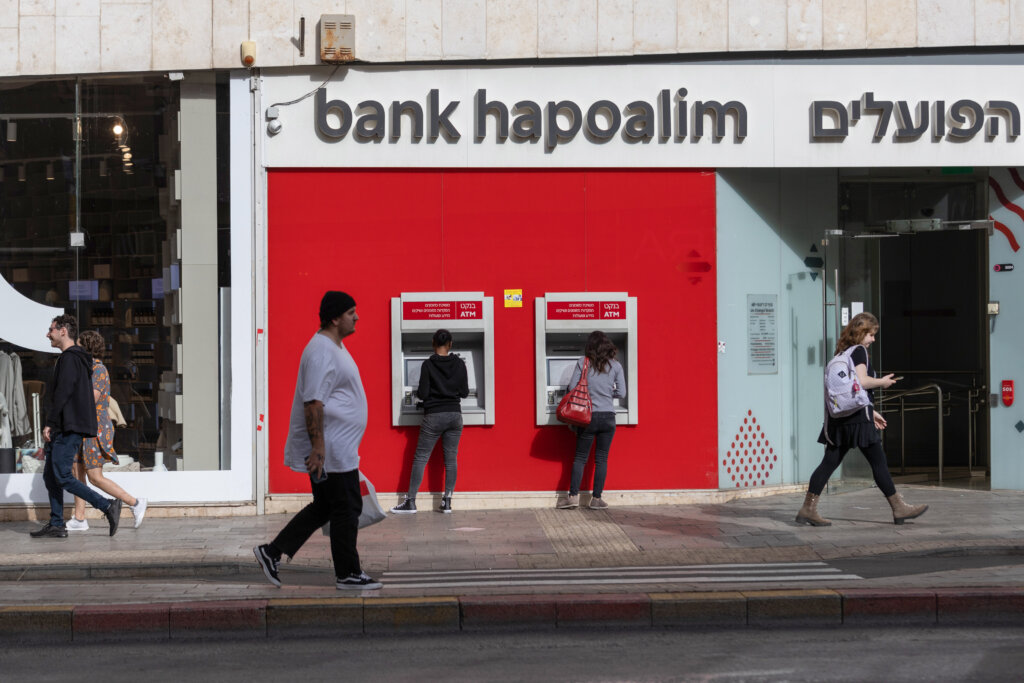As companies raise alarm about court changes, a question: When is it OK to boycott Israel?
Israel advocacy organizations haven’t treated new threats to disinvest as an Israel boycott, prompting claims of hypocrisy

Demonstrators wave Israeli national flags and set off smoke bombs during a protest, by tech workers against proposed judicial reforms, in Tel Aviv on March 9. Several Israeli technology firms have moved assets out of Israel as a result of the push for a court overhaul, prompting questions about what counts as a boycott of the Jewish state. Photo by Getty Images
For two decades, Palestinian activists have been calling for a boycott of Israel.
In response, the Israeli government and leading American Jewish groups have sought to punish companies that have withdrawn any investment in Israel over political concerns — even when those firms insist they are only refusing to do business in the Israeli-occupied West Bank and not joining the Palestinian-led boycott campaign with its controversial demands.
But does that punishment still follow if the political concerns that prompt disinvestment are about domestic Israeli politics, rather than Palestinian human rights?
It’s a question pro-Israel organizations may have to answer as some Israeli firms and international investors have announced that they will move cash and operations out of the country over judicial reforms proposed by the new, far-right Israeli government.

On Sunday, Israeli media reported that 255 Jewish business leaders in the U.S. with billions invested in Israel had sent a letter to Prime Minister Benjamin Netanyahu warning that they would “reevaluate their reliance on Israel as a strategic destination for investment” if changes to the Supreme Court went through.
That followed recent announcements by several Israeli technology firms that they would move billions of dollars out of the country, and in at least one case help employees transfer to offices outside Israel.
“In the emerging reform, there is no certainty that we can conduct international economic activity from Israel,” said Eynat Guez, the chief of Papaya Global, a payroll firm valued at $3.7 billion. “This is a painful but necessary business step.”
The investors and company leaders are concerned about legislation working its way through Israel’s parliament that would overhaul the country’s supreme court. The bill would allow a simple majority of lawmakers to override rulings by the court, which has served as a check on the increasingly right-wing Israeli government. Critics of the changes argue that it would fatally undermine liberal democracy in Israel, while supporters claim it would enhance democracy by increasing the power of elected lawmakers over judges.
So far, the announcements of actual or potential disinvestment have elicited little of the opprobrium prompted by previous corporate decisions to move money out of Israel over political concerns.
“It’s kind of calling their bluff,” said Rabbi Jill Jacobs, the director of T’ruah, a rabbinical human rights organization.
Little room for nuance
When Ben & Jerry’s announced two years ago that it would stop selling ice cream in the Israeli-occupied West Bank, the reaction was swift. Israel’s president called the move “economic terrorism,” while the Anti-Defamation League said the Vermont company had reinforced antisemitism. State governments sprung into action to enforce laws and policies meant to punish boycotts of the country.
All this, despite the fact that Ben & Jerry’s said it hadn’t, actually, joined the movement to boycott Israel, known as Boycott, Divestment and Sanctions, or BDS. Many Jewish leaders view BDS as an serious threat to Israel because it demands citizenship for millions of Palestinian refugees and their descendants.

When Morningstar, a major financial services firm, acquired a company that had docked Israel points on its socially-responsible investing scorecard over human rights concerns, the largest Jewish organizations in the country said it was promoting BDS. There was far less outcry when a trio of international credit agencies — Moody’s, Fitch Ratings and S&P — warned that they might lower Israel’s credit rating if the judicial reforms went through.
Max Raskin, a law professor at New York University, criticized Moody’s for “taking a political side” in the debate, but stopped short of accusing it of endorsing a boycott.
(JLens, a Jewish investment advocacy group that led the charge against Morningstar, did not reply to multiple requests for comment about Moody’s.)
Some longtime defenders of Israel have even suggested that disinvestment is warranted — if not desirable — in order to pressure Netanyahu to halt the reforms. Yossi Klein Halevi, a prominent Israeli author, once mocked Airbnb, the lodging platform, for refusing to operate in Israeli settlements and called it a “selective boycott.” But last week, Klein Halevi told the Forward that Americans should consider not purchasing Israel Bonds in reaction to the judicial reforms.
Many have taken note of this discrepancy on social media.
“Who is and who isn’t allowed to do BDS? Explain it to me like I’m five,” Rohan Talbot, director of advocacy at Medical Aid for Palestinians, a British nonprofit, said on Twitter.
Making distinctions
The BDS movement was launched in 2005 and calls on international supporters of the Palestinians to end economic and cultural ties with Israel until the country meets certain demands, including the “right of return” for Palestinian refugees, which could end the Jewish majority in Israel — something many of the country’s supporters view as an existential concern.
Perhaps owing to its absolutist demands, the BDS movement itself has not found much support among American corporations. But some companies, like Ben & Jerry’s and Airbnb, have heeded calls by activists to stop doing business in West Bank Israeli settlements. That’s an action also encouraged by many liberal Zionists, but still treated as a form of BDS by prominent Jewish advocacy groups such as the American Jewish Committee. Avoiding business in Israeli settlements is also forbidden under many of the laws passed in more than 30 states meant to crack down on boycotts of Israel.
“We have taken the position, consistently, that these selective boycotts are just as illegal as total boycotts,” Marc Stern, chief legal officer of the AJC, said after Ben & Jerry’s announced it would seek to end sales in the West Bank.
Stern said Monday that the economic protests against judicial reform are different than past cases because the companies and investors acting now are not supporting BDS. “Companies that may reevaluate doing business in Israel out of concern over possible changes in the judicial system affecting their own business is categorically different than the BDS movement,” Stern said.
The Anti-Defamation League took a similar position in a statement to the Forward.
“Protests against the judicial reforms are in no way analogous to the nefarious goals of the BDS movement which is rooted in rejecting Jewish people’s right to self-determination and the destruction of the state of Israel,” the organization said.
To some, though, it’s a blurry distinction considering that none of the previous companies targeted by these organizations for supporting BDS actually believed they were doing so. “The decision to halt sales outside Israel’s democratic borders is not a boycott of Israel,” Ben Cohen and Jerry Greenfield, founders of Ben & Jerry’s wrote in a New York Times op-ed following the company’s announcement.
Lara Friedman, president of the Foundation for Middle East Peace, which works on Palestinian human rights issues, who has tracked anti-boycott laws since 2014, said that many Israel advocacy groups only seem concerned about actions that companies take over Palestinian human rights concerns.
Friedman said that state laws that bar companies that boycott Israel from receiving state contracts were clearly written with Palestinian advocacy in mind, but that the language in them would apply to any company — even Israeli firms — that decide to move money out of Israel if the court overhaul is approved.
To take a representative example, in Illinois the state pension board is barred from investing in companies that engage “in actions that are politically motivated and are intended to penalize, inflict economic harm on, or otherwise limit commercial relations with the State of Israel.”
“I could imagine there are people who would say, ‘Fine, technically these companies might come into conflict with the laws, but that’s clearly not the intent and it’s ridiculous to have this conversation,’” Friedman said. “That’s quite clarifying.”
More talk than action?
Others push back on the idea that there is any double standard in the response to companies and investors worried about the current political situation in Israel, because, they say, not much has actually happened: the three Israeli companies that made headlines for threatening to withdraw investments moved cash between bank accounts, but didn’t shut down operations in Israel. And the letter from Jewish investors was speculative — not an announcement of disinvestment.
Eugene Kontronovich, a law professor at George Mason University who has spoken out in favor of the proposed changes to Israel’s supreme court, and has defended state laws cracking down on BDS, said he had not seen anything yet that suggested companies were actually refusing to do business with Israel.
He pointed out that Papaya Global praised the Israeli Bank HaPoallim for assistance following the collapse of Silicon Valley Bank in California. And Kontronovich argued that the language used the letter from business leaders — “revaluate their reliance” — did not sound like a boycott threat.

“Without knowing their subjective intent, it seems to me they carefully chose language that makes clear their lack of intention to boycott,” he said in an email.
One difference between the current rumblings about disinvestment from Israel and past rounds is that many of those pulling funds from Israel now are offering some degree of economic explanation.
When Riskified, an Israeli financial technology company, transferred $500 million out of the country and offered employees relocation to its office in Lisbon, Eido Gal, the chief executive, said he thought the legal reforms would be bad for business.
“The laws being passed can lead to the dismantling of our independent judicial system,” he told employees in an email. “In high likelihood, this will lead to a meaningful and prolonged economic downturn in Israel.”
There is also no concerted effort to encourage companies to boycott Israel over the judicial reforms like there has been over the Palestinian issue. At a press conference Sunday about the negative economic impact of the reforms, a group of Israeli technology executives and other leaders opposed to the changes said they weren’t calling for anyone to move their money out of Israel — but that investors would naturally be scared away by instability.
“What we’re seeing is not an orchestrated event,” said Dany Bahar, an economist at Brown University. “Markets work.”
















